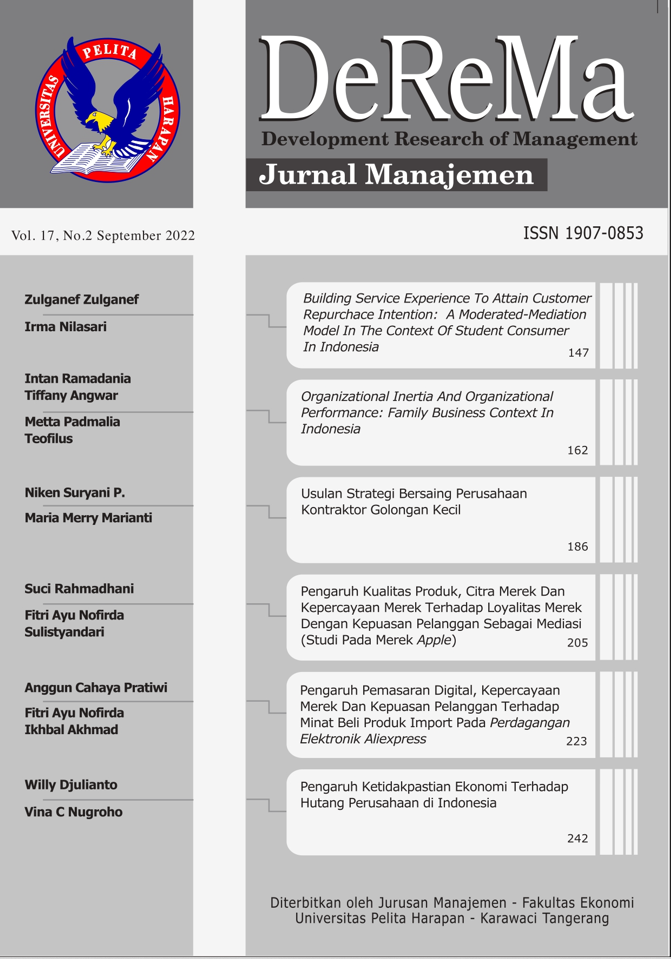PENGARUH KETIDAKPASTIAN EKONOMI TERHADAP HUTANG PERUSAHAAN DI INDONESIA [THE EFFECT OF ECONOMIC UNCERTAINTY ON COMPANY DEBT IN INDONESIA]
DOI:
https://doi.org/10.19166/derema.v17i2.5888Keywords:
Ketidakpastian ekonomi, pengaruh pasar, pengaruh buku, Economic uncertainty, market influence, book influenceAbstract
Economic uncertainty in one country is one of the factors that influence the decision making of debt financing in companies. A high level economic uncertainty can reduce the company's debt level. However, it can also increase the company's debt level. This study aims to examine the effect of economic uncertainty on the level of corporate debt in Indonesia. In this study using 250 companies listed on the Indonesia Stock Exchange starting from the period 2012Q1-2020Q4. The results of the study indicate that economic uncertainty has a negative effect on the market leverage and book leverage of the company. In addition, companies in Indonesia tend to choose to reduce their debt funding when economic uncertainty occurs.
Abstrak dalam Bahasa Indonesia. Ketidakpastian ekonomi dalam suatu negara menjadi salah satu faktor yang berpengaruh dalam pengambilan keputusan pendanaan utang pada perusahaan. Tingkat ketidakpastian ekonomi yang tinggi bisa menurunkan tingkat utang perusahaan. Namun, bisa juga meningkatkan tingkat utang perusahaan. Penelitian ini bertujuan untuk meneliti pengaruh ketidak pastina ekonomi terhadap tingkat hutang perusahaan di Indonesia. Di dalam penelitian ini menggunakan 250 perusahaan yang terdaftar di Bursa Efek Indonesia mulai dari periode 2012Q1-2020Q4. Hasil penelitian menunjukkan bahwa ketidak pastian ekonomi economi berpengaruh negatif terhadap market leverage dan book leverage perusahaan. selain itu perusahaan di Indonesia cenderung memilih untuk mengurangi pendanaan utang mereka pada saat ketidakpastian terjadi.
References
Ahir, H., Bloom, N., & Furceri, D. (2018). The World Uncertainty Index. SSRN Electronic Journal. https://doi.org/10.2139/ssrn.3275033
Al-Thaqeb, S. A., & Algharabali, B. G. (2019). Economic policy uncertainty: A literature review. Journal of Economic Asymmetries, 20. https://doi.org/10.1016/j.jeca.2019.e00133
Baker, S. R., Bloom, N., & Davis, S. J. (2016). Measuring economic policy uncertainty. Quarterly Journal of Economics, 131(4). https://doi.org/10.1093/qje/qjw024
Bansal, R., & Yaron, A. (2004). Risks for the long run: A potential resolution of asset pricing puzzles. Journal of Finance, 59(4). https://doi.org/10.1111/j.1540-6261.2004.00670.x
Bloom, N. (2016). Fluctuations in uncertainty. Voprosy Ekonomiki, 2016(4). https://doi.org/10.32609/0042-8736-2016-4-30-55
Cao, W., Duan, X., & Uysal, V. B. (2013). Does political uncertainty affect capital structure choices? Journal of Chemical Information and Modeling, 53(9), 1689-1699.
Dewi, N., & Badjra, I. (2014). Pengaruh Likuiditas, Profitabilitas, Tangibility Assets, Ukuran Perusahaan dan Pajak Terhadap Struktur Modal. E-Jurnal Manajemen Universitas Udayana, 3(10).
Fajgelbaum, P. D., Schaal, E., & Taschereau-Dumouchel, M. (2017). Uncertainty traps. Quarterly Journal of Economics, 132(4),1641-1692. https://doi.org/10.1093/qje/qjx021
Gulen, H., & Ion, M. (2016). Policy uncertainty and corporate investment. Review of Financial Studies, 29(3). https://doi.org/10.1093/rfs/hhv050
Hendra, E., & Suk, K. S. (2015). Default Spread dan Term Spread sebagai Variabel Proxy Siklus Bisnis pada Model Fama-French. Binus Business Review, 6(2). https://doi.org/10.21512/bbr.v6i2.977
Hermuningsih, S. (2014). Pengaruh Profitabilitas, Growth Opportunity, Struktur Modal Terhadap Nilai Perusahaan Pada Perusahaan Publik di Indonesia. Buletin Ekonomi Moneter Dan Perbankan, 16(2), 127-148. https://doi.org/10.21098/bemp.v16i2.27
Indasari, A. P., & Yadnyana, I. K. (2018). Pengaruh Profitabilitas, Growth Opportunity, Likuiditas, dan Struktur Modal Pada Nilai Perusahaan. E-Jurnal Akuntansi, 2018(1). https://doi.org/10.24843/EJA.2018.v22.i01.p27
Julio, B., & Yook, Y. (2012). Political uncertainty and corporate investment cycles. Journal of Finance, 67(1). https://doi.org/10.1111/j.1540-6261.2011.01707.x
Makololo, P., & Seetharam, Y. (2020). The effect of economic policy uncertainty and herding on leverage: An examination of the BRICS countries. Cogent Economics and Finance, 8(1). https://doi.org/10.1080/23322039.2020.1821482
Pástor, Ľ., & Veronesi, P. (2013). Political uncertainty and risk premia. Journal of Financial Economics, 110(3). https://doi.org/10.1016/j.jfineco.2013.08.007
Salehi, M., & Manesh, N. B. (2012). A Study of the Roles of Firm and Country on Specific Determinates in Capital Structure: Iranian Evidence. International Management Review, 8(2), 51-62, 85.
Sari, I. P., & Januarti, I. (2011). Pengaruh Growth Opportunity Terhadap Leverage Dengan Debt Covenant Sebagai Variabel Moderating. Seminar Nasional Ilmu Ekonomi Terapan, Unimus, 67-76.
Schwarz, L. A. D., & Dalmácio, F. Z. (2020). The relationship between economic policy uncertainty and corporate leverage: Evidence from Brazil. Finance Research Letters, 40, 101676. https://doi.org/10.1016/j.frl.2020.101676
Van Nieuwerburgh, S., & Veldkamp, L. (2006). Learning asymmetries in real business cycles. Journal of Monetary Economics, 53(4). https://doi.org/10.1016/j.jmoneco.2005.02.003
Wati, M., Wijayanti, A., & Siddi, P. (2020). Faktor-Faktor Yang Mempengaruhi Struktur Modal. Accounting Global Journal, 4(1), 97- 113. https://doi.org/10.24176/agj.v4i1.4318
Zhang, G., Han, J., Pan, Z., & Huang, H. (2015). Economic policy uncertainty and capital structure choice: Evidence from China. Economic Systems, 39(3). https://doi.org/10.1016/j.ecosys.2015.06.003
Downloads
Published
Issue
Section
License
Authors who publish with this journal agree to the following terms:
1) Authors retain copyright and grant the journal right of first publication with the work simultaneously licensed under a Creative Commons Attribution License (CC-BY-SA 4.0) that allows others to share the work with an acknowledgement of the work's authorship and initial publication in this journal.
2) Authors are able to enter into separate, additional contractual arrangements for the non-exclusive distribution of the journal's published version of the work (e.g., post it to an institutional repository or publish it in a book), with an acknowledgement of its initial publication in this journal.
3) Authors are permitted and encouraged to post their work online (e.g., in institutional repositories or on their website). The final published PDF should be used and bibliographic details that credit the publication in this journal should be included.





